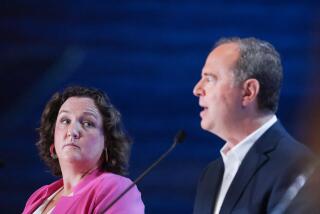Republicans look to improve brand, tech skills in Silicon Valley

It’s not easy being a conservative in Silicon Valley.
People who lean to the right are vastly outnumbered in the nation’s high-tech hub, and say they sometimes have to downplay their views.
“It does make you stand out a little bit. You have to be careful how you position yourself. You have to be careful what you say in public,” Eric Jackson, co-founder of CapLinked, said during a panel discussion Saturday about conservatives in the industry at the inaugural Lincoln Labs Reboot conference.
He noted that he was shining a spotlight on his views by taking part in the conference, before joking, “I guess I can kiss all my future venture capital funding goodbye.”
Liberal dominance in the valley has boosted Democratic campaigns with cutting-edge technology, allowing them to reach voters and raise money in innovative ways, while the GOP has suffered from a culture that led it to clash with its own technologists.
Hundreds of conservative and libertarian — or “conservatarian” — political operatives and techies gathered over the weekend in the liberal heart of California hoping to change that equation.
“Having taken a drubbing in the last couple of elections, I think the party has woken up to the idea of having better technology,” said Harmeet Dhillon, vice chair of the California Republican Party, during a panel Friday evening. “I can order Uber to come to my house in two minutes. We still don’t have good apps to give me a good map to walk precincts on a weekend.”
As part of the Lincoln conference, a 24-hour hackathon was simultaneously taking place nearby in the airy, exposed-brick headquarters of Brigade Media, a new firm created by Napster co-founder Sean Parker.
Eleven teams worked overnight, sipping energy drinks as they debated how to build solutions to various political and governmental challenges in 24 hours.
“They are living, eating and sleeping at Brigade. My advice is to go earlier rather than later because it gets kind of ripe the longer you wait,” said Lincoln Labs co-founder Garrett Johnson.
The three top teams — who designed mobile polling software, an app that allows users to avoid having their web-browsing habits tracked on their phones, and a service that aimed to make police deployments more effective — split $10,000 in prize money.
Potential 2016 presidential candidate Rand Paul, a keynote speaker at the conference, cited such free-market solutions as evidence of the good that can happen when government gets out of the way.
“I have nothing but optimism when I’m out here because I see amazing potential for growth away from the disaster that is Washington. I don’t have to think there has to be a governmental solution for everything,” the Republican senator from Kentucky told hundreds of people gathered in a hotel ballroom.
“Don’t be depressed with how bad government is,” Paul said. “Use your ingenuity, use your big head to think of solutions the marketplace can figure out, that the idiots and trolls in Washington will never come up with.”
Paul, a leading critic of the National Security Agency over its spying scandal, is a natural fit with conservatives in the valley, who aided his father, former Rep. Ron Paul, in two unsuccessful White House bids. The younger Paul, who also raised money and met with technology executives during his visit, did not mention his conservative social views, which could cause him problems in Silicon Valley.
“For a lot of Silicon Valley and a lot of the technology community, the social issues are disqualifying,” said Republican gubernatorial candidate Neel Kashkari, who supports abortion and gay-marriage rights. “They won’t hear the rest of our economic agenda if we’re not with them socially.”
Lincoln Labs is a new organization that seeks to identify conservatives who work in technology. What began as meet-ups and happy hours turned into a three-day conference.
“There were a lot more of us than we ever thought, whether in the Bay Area and we’re closet conservatarians as we like to say, or they’re loud and proud and living in Texas,” said Aaron Ginn, co-founder of Lincoln Labs, at a Saturday presentation.
Lincoln Labs is one of several efforts born in the aftermath of the 2012 election, which set off tsunami warnings in GOP circles because of the Democrats’ stark advantage in the use of technology and data. The Republican National Committee is spending $17 million on efforts to modernize its technology and use of data, with mixed reviews.
The founders of Lincoln Labs said they saw the need firsthand when their technology efforts were rebuffed by some party and campaign officials in 2012.
They face obstacles in their current endeavor: One of Lincoln Labs’ first hackathons had to switch locations when employees of the firm that had planned to host it complained about the group’s backing by entities related to the Koch brothers, two wealthy donors who give money to conservative causes.
Democrats also hold a tremendous voter registration advantage in Silicon Valley and are not ceding any ground. Possible 2016 presidential candidate Hillary Clinton is visiting Facebook on Monday and President Obama is headed there later in the week to raise money.
The industry’s campaign donations, which have grown sharply since 2000, also tilt toward Democrats. In the 2012 election, individuals and companies associated with the industry contributed $64 million, with nearly two-thirds pocketed by Democrats, according to the Center for Responsive Politics.
But there are some openings, as seen in a report last week by Politico that Napster co-founder Parker had donated more than half a million dollars to GOP efforts in this year’s midterm elections. Parker overwhelmingly gave to Democrats in the past.
The broader questions are whether Silicon Valley and the Republican infrastructure can learn to work together and whether the pledges for improved technology and use of data will translate into measurable action in the next presidential contest.
Bret Jacobson, co-founder of the digital advocacy firm Red Edge, said conservatives need to understand what the left did well, create their own digital approaches, and replicate them across the party and campaigns.
“We view 2013, 2014, 2015, 2016 as a continuum, and a process the right will go through culturally, and then we’ll be able to judge whether it worked,” he said during a panel discussion Saturday.
Twitter: @latseema
More to Read
Start your day right
Sign up for Essential California for news, features and recommendations from the L.A. Times and beyond in your inbox six days a week.
You may occasionally receive promotional content from the Los Angeles Times.







